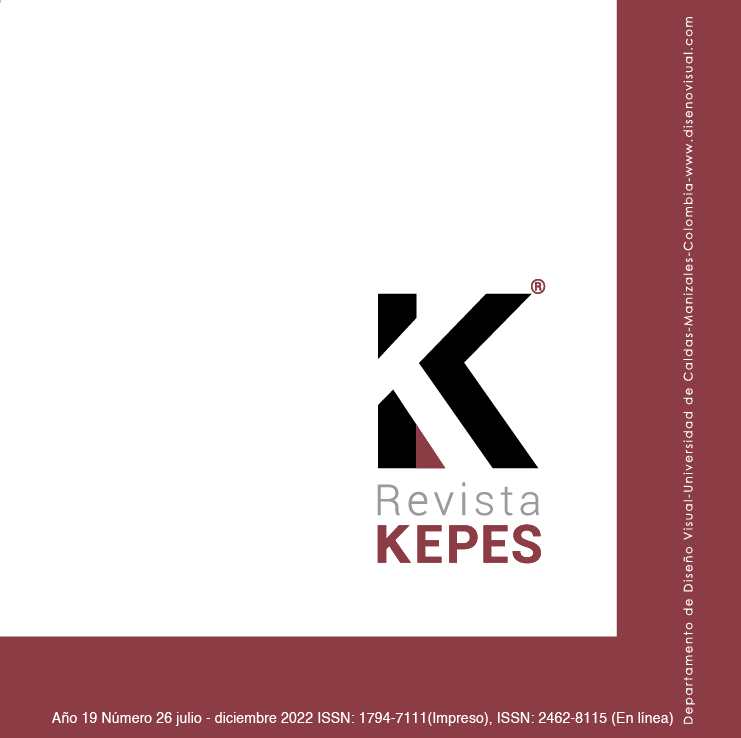Authors
Abstract
Introduction: this article analyzes the results of the FamiliarizArte Project, awared with the Spiral Award for Education at the national level. This Project uses artistic mediation through the contemplation of four Works: Xentes que ollan (People watching) by Díaz Pardo, Casas (Houses) by Antonio Tenreiro, Vista da Coruña (View of La Coruña) by Urbano Lugrís and Zoolóxico (Zoo) by Lago Rivera, belonging to the pictorial background of the Museo de Belas Artes da Coruña (Northwest Spain) in order to provoke a reflective context that allows analyzing the impact of Covid-19. Method: to do this, an activity proposal is carried out between three institutions: the CIFP Anxel Casal, which acts as a proponent, the Montealto Children's School, which hosts and promotes the project and the Museo de Belas Artes da Coruña, which donates its pictorial collection for the composition of a visual narrative that serves as a contemplative and reflective framework. Results and conclusions: the results of the project, analyzed through the qualitative panel technique (De Keulenaer, 2008), show how the chosen paintings have allowed the families of the school to build an emotional story of what happened, placing the experiences in a manageable context, which reflects on fear and shapes hope.
Keywords
References
Belver, M. (2011). El arte y la educación artística en contextos de salud. Arte, Individuo y Sociedad, 23(especial), 11-17. https://doi.org/10.5209/rev_ARIS.2011.v23.36739
Berardi, F. (2020). Crónica de la psicodeflación. En P. Amadeo (Ed.), Sopa de Wuhan (pp. 35-54). ASPO. https://redclade.org/wp-content/uploads/Sopa-de-Wuhan-ASPO.pdf
Blanco, V. y Cidrás, S. (2019). Educar a través da arte. Cara a una escola imaxinada. Kalandraka.
Cabrera, J. y De la Herrán, A. (2015). Creatividad, complejidad y formación: un enfoque transdisciplinar. Revista Complutense de Educación, 26(3), 505-526. https://doi.org/10.5209/rev_RCED.2015.v26.n3.43876
Carrascal, S. y Solera, E. (2014). Creatividad y desarrollo cognitivo en personas mayores. Arte, Individuo y Sociedad, 26(1), 9-19. https://doi.org/10.5209/rev_ARIS.2014.v26.n1.40100
Collin, F. (2006). Praxis de la diferencia. Liberación y libertad. Barcelona: Icaria.
De Keulenaer, F. (2008). Panel Survey. En P. J. Lavrakas (Ed.), Enciclopedy of Survey Research Methods (pp. 570-573). Sage.
Díaz-Barriga, A. (2020). La escuela ausente, la necesidad de replantear su significado En J. Girón (Ed.), Educación y Pandemia (pp. 19-29). UNAM.
Díez-Navarro, M. C. (1996). La oreja verde de la escuela. Trabajo por proyectos y vida cotidiana en la escuela infantil. La Torre.
Eisner, W. E. & Barone, T. (2006). Arts-Based Educational Research. En J. L. Green, G. Camilli y P. B. Elmore (Eds.), Handbook of complementary methods in education research (pp. 95-109). AERA.
Escribano, F. (2016). Desenterrando el silencio: Antoni Benaiges, el maestro que prometió el mar. Blume
Errázuriz, L.H. (2015). Calidad estética del entorno escolar: el (f) actor invisible. Arte, Individuo y Sociedad, 27(1), 81-100. https://doi.org/10.5209/rev_ARIS.2015.v27.n1.43861
Fancourt, D. & Finn, S. (2019). What is the evidence on the role of the arts in improving health and well-being? A scoping review. WHO Regional Office for Europe. (Health Evidence Network – HEN, synthesis report 67). https://bit.ly/3AcPy0B
Han, B. C. (2020). La emergencia viral y el mundo de mañana. En P. Amadeo (Ed.), Sopa de
Wuhan (pp. 297-111). ASPO. https://redclade.org/wp-content/uploads/Sopa-de-WuhanASPO.pdf
Hunter, M. (2020, 15 de abril). Ese sentimiento incómodo en tiempos de coronavirus podría ser un duelo. CNN en Español. https://cnn.it/3QfzuR7
Innerarity, D. (2020). Pandemocracia. Una filosofía de la crisis del coronavirus. Galaxia Gütenberg.
Latorre, A. (2003). La investigación-acción. Graó.
López-Petit, S. (2020). El coronavirus como declaración de guerra. En P. Amadeo (Ed.), Sopa de Wuhan (pp. 55-58). ASPO. https://redclade.org/wp-content/uploads/Sopa-de-WuhanASPO.pdf
Markus, G. (2020). El virus, el sistema letal y algunas pistas para después de la pandemia. En P. Amadeo (Ed.), Sopa de Wuhan (pp. 129-134). ASPO. https://redclade.org/wp-content/uploads/Sopa-de-Wuhan-ASPO.pdf
Martínez-Vérez, M. V., Abad, J. y Hernández, D. (2018). Cuerpo de escritura: el lugar de la palabra. Atenea, 517, 89-103.
http://dx.doi.org/10.4067/S0718-04622018000100089.
Martínez-Vérez, M. V., Albar-Mansoa, P. J., López-Méndez, L. y Torres-Vega, S. (2020). Cápsulas de arte: memoria frente al Alzheimer. Interface, 24, 1-15. https://doi.org/10.1590/Interface.200128
Martínez-Vérez, M. V., Vilas-Ares, M. D. y Montero-Seoane, A. (2021) Infancias confinadas: construyendo la escuela desde la educación artística. Arte, Individuo y Sociedad, 33(3), 445-462. https://revistas.ucm.es/index.php/ARIS/article/view/70230/4564456557156
Mora F. (2013). Neuroeducación: sólo se puede aprender aquello que se ama. Alianza.
Mundet, A., Beltrán, A. y Moreno, A. (2015). Arte como herramienta social y educativa. Revista Complutense de Educación, 26(2), 315-329. http://hdl.handle.net/11162/121450
Muñoz, J. P. (2020). Covid-19: El miedo, el efecto silencioso de las epidemias. The Interdisciplinary Journal of Epidemiology and Public Health (iJEPH), 3(1), 1-3. DOI: 10.18041/2665-427X/ijeph.1.6256
Ortega, P. (2013). La pedagogía de la alteridad como paradigma de la educación intercultural. Revista Española de Pedagogía, 71(256), 401-421.
Ortega, P. (2016). La ética de la compasión en la pedagogía de la alteridad. Revista Española de Pedagogía, 264, 443-464. https://revistadepedagogia.org
Pink, S. (2014) Digital - Visual - Sensory - Design Anthropology: ethnography, imagination and intervention. Arts and Humanities in Higher Education, 13(4), 412-427. DOI:10.1177/1474022214542353
Razo, A. (2018). La reforma integral de la educación media superior en el aula: política, evidencia y propuestas. Perfiles Educativos, XL(159), 90-106. http://www.scielo.org.mx/scielo.php?script
Reidl, L. M. (2012). El diseño de investigación en educación: conceptos actuales. Metodología de Investigación en Educación Médica, 1(1), 35-39. https://www.redalyc.org/pdf/3497/349736284009.pdf
Ruíz, C. (2010). La educación en la sociedad postmoderna: Desafíos y oportunidades. Revista Complutense de Educación, 21(1), 173-188. Disponible en https://revistas.ucm.es/index.php/RCED/article/view/RCED1010120173A
Sousa, B. (2020, 9 de junio). El virus es un pedagogo que nos intenta decir algo, el problema es saber si vamos a escucharlo.
https://ethic.es/entrevistas/boaventura-de-sousa-santoscoronavirus/
Tranier, J., Bazán, S., Porta, L. y Di Franco, M. G. (2020). Concatenaciones fronterizas: pedagogías, oportunidades, mundos sensibles y Covid-19. Praxis educativa, 24(2), 1-18. https://dx.doi.org/10.19137/praxiseducativa-2020-240203
Vázquez, V. (2010). La perspectiva de la ética del cuidado: una forma diferente de hacer educación. Educación XXI, 13(1), 177-197. https://doi.org./10.5944/educxx1.13.1.282
Villanueva, D. (2020). Nadie ha hablado como Jesús. En J. Mª Rodríguez Olaizola, La palabra desencadenada. Creer en tiempos de pandemia (pp. 89-93). Sal Terrae.
Zizek, S. (2020a). El coronavirus es un golpe al capitalismo a lo “Bill Kill” y podría conducir a la reinvención del comunismo. En P. Amadeo (Ed.), Sopa de Wuhan (pp. 21-28). ASPO. https://redclade.org/wp-content/uploads/Sopa-de-Wuhan-ASPO.pdf
Zizek, S. (2020b). Pandemia. La covid-19 estremece al mundo. Anagrama.

 PDF (Español)
PDF (Español)
 FLIP
FLIP























